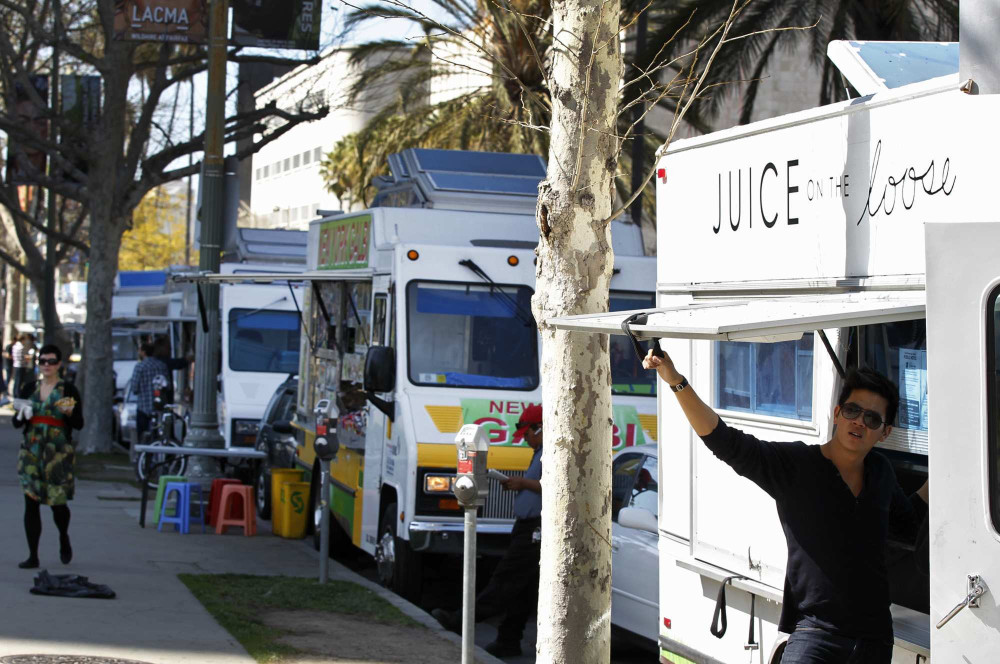By Alexis Barton
The Anniston Star, Ala.
Mary-Anne and Greg Stay started cooking for crowds in 2011, dishing out barbecue from a trailer towed by a pickup.
Their business, Smoke-N-Hot BBQ, was so successful, they’ve since parked the trailer and expanded into a full-service restaurant on Alabama 202. However, the couple say they might not have made it into the restaurant business without starting on wheels.
“The first time we opened our food truck we literally we opened the window, then looked at each other and said ‘What do we do now?'” she said.
The food truck trend, a fixture in many urban centers where entrepreneurs use them as a low-cost way to break into business, rolls a bit slower in Calhoun County, but it’s here. The Calhoun County Health Department’s environmental office says it’s permitted 14 “mobile units,” though just three or four operate on a daily basis. Vaughan Fleming, the office’s supervisor, says most use their trucks as companions to brick-and-mortar restaurants.
Owners must get permits for permits for both a commissary — a sort of homebase with storage, a sink, a restroom and a wastewater disposal system — and the mobile unit, Fleming said. Depending on the type of food they plan to serve, they may be required to get a manager’s certificate. Owners must also submit a route schedule so county officials know where to find them.
“Once they’re permitted they can go anywhere in the county as long as they have the property owner’s permission,” Fleming said. “Since this is a large county there’s no way we could find them without the route schedule since they’re mobile.”
Kona Ice serves its flavored shaved ice throughout Calhoun County at sporting events, concerts and schools.
Owner Dwayne Wood and operations manager Wayne Rogers have been in business since 2013. In October 2014 they opened a store in Jacksonville to sell gourmet popsicles and candy as well.
“It’s just grown exponentially since then. God has really blessed us, Rogers said.
At Smoke-N-Hot on Alabama 202 recently, Mary-Anne Stay sat at a picnic table indoors, surrounded by Irish blessings and inspirational signs hung on barbecue sauce-colored walls. Mary-Anne Stay said they began planning for their truck while thousands of miles away in Iraq. The Stays did some research, found and customized a FEMA trailer and opened up shop a year and a day after they returned home.
“We wanted to do something positive and we wanted to be able to bankroll ourselves,” Stay said. She estimated the cost for the food truck and commissary at around $90,000.
“We just kind of did it right the first time. The health department discouraged us in a nice way,” she said, “We’ve got a really good relationship with them now. If someone wants to start a new food truck, the health department sends them our way to tell them what it’s really like.”
During the time the Stays operated out of portable quarters, their mornings would begin at 4 a.m. so that they could begin smoking their meats “low and slow” over hickory. The sides, influenced by Mary-Anne Stay’s grandmother’s recipes and her own Irish culinary training, were made fresh every day. By 9 a.m. they would pull into that day’s stop and prepare for customers who would arrive by 11. They would serve customers until early evening, and then they would return to the commissary to unload and begin preparing for the next day.
All cooked items were prepared in the truck’s smoker, and the Stays often bought produce and bread from local vendors.
The husband and wife team described working together as a well-practiced dance inside the truck for the ebb and flow of customers at the window. Eventually business owners began pursuing them. Smoke-N-Hot became so successful that the couple recalled a line of customers driving up to the truck’s window in pouring rain to order food.
Fuel costs were a concern. Their diesel truck pulls the food trailer, which runs off a generator. He estimated daily costs of $30-45 gas for powering the truck, and spent nearly $80 every two weeks for the generator’s propane. Eventually they found a way to cut gasoline costs by putting power poles at a few of their permanent locations, Stay said.
This brought their gas costs to about $25 a month, he said. It required the landowners’ permission and inspection by the city and Alabama Power.
His wife estimated they were selling out nearly 320 pounds of pork a day. The restaurant, which opened last July, exists because their customers asked for it, Mary-Anne Stay said. They’ve expanded into providing catering for larger events as well.
“We mean to be a destination,” she said. “Our customers wanted a place they could come to.”
Fleming said that while reality TV shows have aided food trucks’ growth locally, they can make the start-up process seem easier than it is.
“I’ve seen a lot of them fail,” said Fleming. The average one doesn’t make it. In a larger more populated area you may have a better chance.”
Greg’s Hot Dogs’ owner Greg Nuckolls, operates three food carts in the Birmingham area. He turned his experience in the food, beverage and hospitality industry with a desire to work for himself and make good hot dogs into a business three and a half years ago.
Nuckolls said knowing how to treat the customer and providing a good product are key.
But there is no guaranteed recipe for success, Fleming said.
“You have to provide something people want and take into account your overhead,” Fleming said. “When people see that they won’t make millions, sometimes they fold.”
Nuckolls is happy selling gourmet hot dogs from his pushcarts.
“One of the benefits of a mobile unit is it has wheels,” he said. “If it’s in a bad location you get a permit and try it somewhere else. If you build a restaurant you better be real sure it’s a good location.”














































































































































































































































































































































































